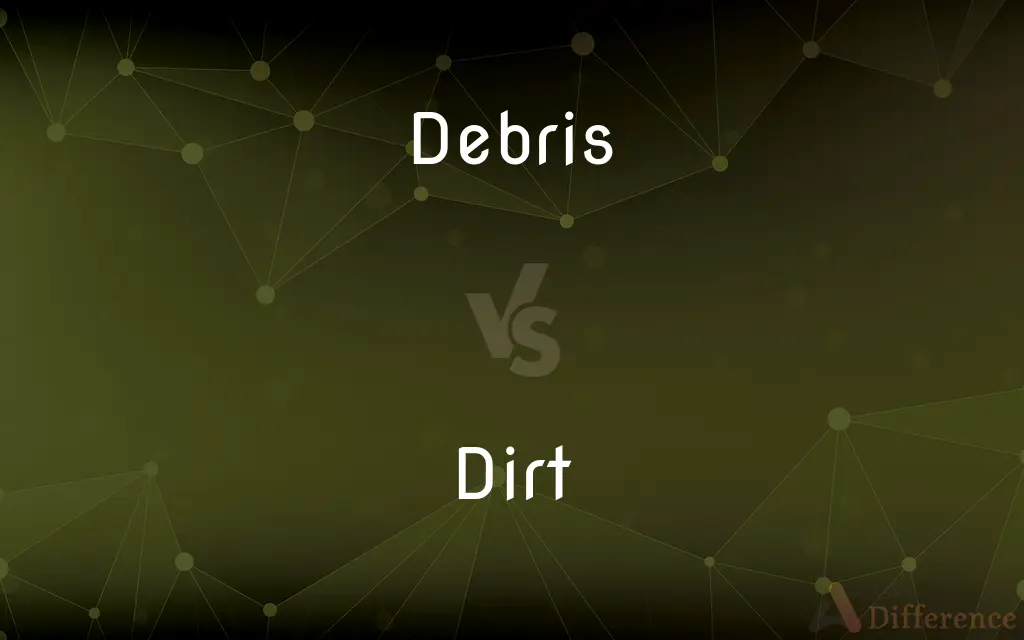Debris vs. Dirt — What's the Difference?
By Fiza Rafique & Urooj Arif — Updated on April 15, 2024
Debris refers to scattered pieces of waste or remains, often resulting from destruction or construction, while dirt generally denotes soil or earth, commonly found on the ground or adhering to objects.

Difference Between Debris and Dirt
Table of Contents
ADVERTISEMENT
Key Differences
Debris typically consists of larger, more heterogeneous pieces of waste materials such as rubble, broken glass, and remnants of construction or destruction. It is often seen in scenarios like demolition sites or areas affected by natural disasters. Dirt, on the other hand, refers to the finer, granular material composed of soil, which includes organic matter, minerals, and tiny rock particles. Dirt is commonly encountered in everyday environments and is a natural part of the earth's surface.
Debris is usually the result of some form of human activity or natural events that disrupt the normal state of things, such as building projects or hurricanes. This can make it temporary and often viewed as something to be cleaned up or removed. Dirt, whereas, is a more permanent, natural component of the earth's ecosystem, essential for plant growth and ecological balance.
The context in which debris and dirt are considered can significantly affect their management and perception. Debris often requires organized cleanup efforts, especially when it poses hazards, such as sharp objects or toxic materials. Dirt, however, is managed through regular cleaning practices and is often simply relocated or used as fill material in landscaping and construction.
While debris can sometimes be recycled or repurposed, such as in the use of crushed concrete for new construction projects, it is generally seen as a nuisance or a byproduct to be dealt with. Dirt can be seen as a resource in many contexts, useful in everything from agriculture to construction, where it serves as a foundational material.
The handling and environmental impact of debris and dirt also differ significantly. Debris disposal must be handled with care to avoid environmental contamination and to recycle materials when possible. Dirt, on the other hand, is part of the natural recycling process of the earth, helping to filter water and support biodiversity.
ADVERTISEMENT
Comparison Chart
Definition
Scattered pieces of waste or remains
Soil or earth, typically granular
Source
Human activity, natural disasters
Natural earth composition
Typical Composition
Mixed materials (metal, wood, glass)
Organic matter, minerals, rock particles
Usage Context
Cleanup required after events
Used in agriculture, construction
Environmental Impact
Potential hazard, requires disposal
Natural part of ecosystems, beneficial
Compare with Definitions
Debris
Debris can vary greatly in size and material depending on its source.
Construction debris included bricks, metal rods, and wooden planks.
Dirt
Dirt is loose soil, often found covering the ground or collecting on surfaces.
His boots were covered in dirt after the hike.
Debris
Debris refers to scattered fragments, especially of demolished structures or natural disasters.
After the tornado, the streets were covered with debris including tree limbs and parts of houses.
Dirt
It is essential for agriculture as a medium for plant growth.
The farmer plowed the dirt to prepare for spring planting.
Debris
Handling debris often involves significant labor and machinery.
Heavy machinery was used to remove large debris from the demolition site.
Dirt
Dirt is composed primarily of minerals, organic material, and microorganisms.
Healthy dirt is rich in nutrients and supports a variety of plant life.
Debris
It often needs to be removed to restore safety and cleanliness.
Emergency teams cleared the debris from roads to enable safe passage.
Dirt
It can be a nuisance indoors, leading to the need for regular cleaning.
She vacuumed the living room to clean the dirt tracked in by the kids.
Debris
Sometimes debris is recycled for other uses.
The debris from the old school was crushed and used as base material for road construction.
Dirt
In construction, dirt is often moved or added as needed in landscaping projects.
Trucks delivered loads of dirt for the new park landscaping.
Debris
Debris (UK: , US: ) is rubble, wreckage, ruins, litter and discarded garbage/refuse/trash, scattered remains of something destroyed, discarded, or as in geology, large rock fragments left by a melting glacier etc. Depending on context, debris can refer to a number of different things.
Dirt
Dirt is unclean matter, especially when in contact with a person's clothes, skin or possessions. In such case they are said to become dirty.
Debris
Scattered pieces of rubbish or remains
Workmen were clearing the roads of the debris from shattered buildings
Leaves and garden debris
Dirt
Earth or soil.
Debris
The scattered remains of something broken or destroyed; rubble or wreckage.
Dirt
A filthy or soiling substance, such as mud or dust.
Debris
Carelessly discarded refuse; litter.
Dirt
Excrement.
Debris
(Geology) An accumulation of relatively large rock fragments
Glacial debris.
Dirt
A squalid or filthy condition.
Debris
(Biology) The fragmented remains of dead or damaged cells or tissue.
Dirt
One that is mean, contemptible, or vile.
Debris
Rubble, wreckage, scattered remains of something destroyed.
Dirt
Obscene language or subject matter.
Debris
Litter and discarded refuse.
Dirt
Malicious or scandalous gossip.
Debris
The ruins of a broken-down structure.
Dirt
Information that embarrasses or accuses.
Debris
(geology) Large rock fragments left by a melting glacier etc.
Dirt
Unethical behavior or practice; corruption.
Debris
Broken and detached fragments, taken collectively; especially, fragments detached from a rock or mountain, and piled up at the base.
Dirt
Material, such as gravel or slag, from which metal is extracted in mining.
Debris
Rubbish, especially such as results from the destruction of anything; remains; ruins.
Dirt
Soil or earth.
Debris
The remains of something that has been destroyed or broken up
Dirt
A stain or spot (on clothes etc); any foreign substance that worsens appearance.
Dirt
Previously unknown facts, or the invented "facts", about a person.
The reporter uncovered the dirt on the businessman by going undercover.
Dirt
(figurative) Meanness; sordidness.
Dirt
(mining) In placer mining, earth, gravel, etc., before washing.
Dirt
Freckles
Dirt
To make foul or filthy; soil; befoul; dirty
Dirt
Any foul of filthy substance, as excrement, mud, dust, etc.; whatever, adhering to anything, renders it foul or unclean; earth; as, a wagonload of dirt.
Whose waters cast up mire and dirt.
Dirt
Meanness; sordidness.
Honors . . . thrown away upon dirt and infamy.
Dirt
In placer mining, earth, gravel, etc., before washing.
Dirt
To make foul of filthy; to dirty.
Dirt
The part of the earth's surface consisting of humus and disintegrated rock
Dirt
The state of being covered with unclean things
Dirt
Obscene terms for feces
Dirt
Disgraceful gossip about the private lives of other people
Dirt
(of roads) not leveled or drained; unsuitable for all year travel
Common Curiosities
What is debris?
Debris refers to scattered fragments or remains, often resulting from destruction or construction activities.
How does debris impact the environment?
Debris can be an environmental hazard, potentially containing harmful materials that require careful disposal.
Why is dirt important?
Dirt is crucial for ecological balance, providing the medium for plant growth and supporting diverse ecosystems.
What does dirt refer to?
Dirt generally refers to soil or earth, the loose material that covers much of the planet's surface.
Is dirt considered a form of pollution?
Dirt is not typically considered pollution; however, excessive dirt in certain contexts, like runoff into waterways, can be problematic.
Can debris be recycled?
Yes, certain types of debris, like concrete or metal, can be recycled and reused in other construction projects.
What is the difference between dirt and soil?
"Dirt" is often used colloquially to refer to soil, especially when displaced or considered out of place.
How can debris be harmful?
Debris can be harmful by causing physical hazards, obstructing areas, or leaching toxic substances.
What are common sources of debris?
Common sources include construction sites, demolition sites, and areas affected by natural disasters like tornadoes or earthquakes.
How is dirt used in construction?
In construction, dirt is used to create foundations, fill landscapes, and shape the terrain.
What types of materials are found in debris?
Debris can include a wide range of materials such as wood, glass, metal, and plastic, depending on its source.
What role does dirt play in agriculture?
Dirt serves as the primary medium for growing plants, providing nutrients, and anchoring roots.
What measures are taken to dispose of debris properly?
Proper disposal involves sorting, recycling possible materials, and using landfills or specialized facilities for hazardous components.
Can debris cause problems in urban areas?
Yes, debris can obstruct traffic, pose safety risks, and require significant resources to manage and clean up.
How is dirt maintained for health?
Maintaining healthy dirt involves managing its composition, moisture, and microbial content, especially in agricultural settings.
Share Your Discovery

Previous Comparison
Conscribe vs. Conscript
Next Comparison
Beryl vs. EmeraldAuthor Spotlight
Written by
Fiza RafiqueFiza Rafique is a skilled content writer at AskDifference.com, where she meticulously refines and enhances written pieces. Drawing from her vast editorial expertise, Fiza ensures clarity, accuracy, and precision in every article. Passionate about language, she continually seeks to elevate the quality of content for readers worldwide.
Co-written by
Urooj ArifUrooj is a skilled content writer at Ask Difference, known for her exceptional ability to simplify complex topics into engaging and informative content. With a passion for research and a flair for clear, concise writing, she consistently delivers articles that resonate with our diverse audience.













































